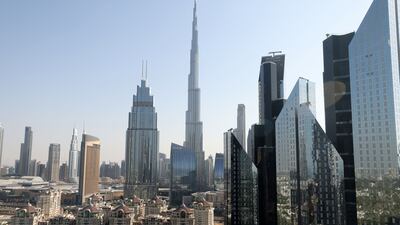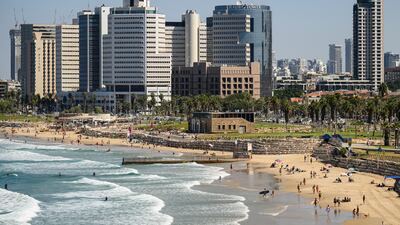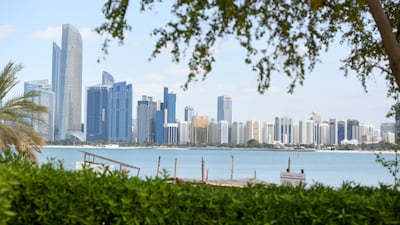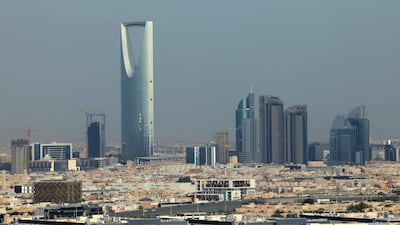Dubai and Abu Dhabi have ranked first globally for ease of entry for global talent in this year's Global Cities Index.
The UAE’s open immigration policies seek to attract and retain foreigners in a bid to diversify its economy.
Dubai has also retained its top spot in the Middle East and North Africa region in terms of global engagement and connectivity, after ranking 24th out of 156 cities.
This is the fourth-consecutive year that Dubai has claimed a spot in the top 25 of the index, management consultancy Kearney said on Monday.
Doha ranked second in the Mena region and 51st globally, while Tel Aviv was third regionally and 57th worldwide in the Global Cities Index. Other regional cities featured in the index include Abu Dhabi (fourth regionally and 59th globally), Riyadh (fifth regionally and 64th globally) and Jeddah (sixth regionally and 84th globally).
Abu Dhabi also ranked first globally for internet speed, the index found.
The index measures the global engagement of 156 cities across five categories – business activity, human capital, information exchange, cultural experience and political engagement – and aims to quantify the extent to which a city can attract, retain, and generate global flows of capital, people and ideas, Kearney said.
“As patterns of global trade and capital flows shift, cities in the Middle East have enormous opportunity to leverage their strategic location, robust economies, attractive immigration policies, and underlying digital infrastructure to not only mitigate risks, but also propel economic growth,” said Rudolph Lohmeyer, a partner at Kearney.
In recent years, the UAE has implemented sweeping economic, legal and social reforms to attract skilled workers.
The government’s overhaul of visa programmes has increased opportunities for foreign workers to live and work in the country, including simplifying eligibility criteria for the 10-year golden visa and expanding the categories of beneficiaries.
The green visa was also introduced, offering five-year residency to skilled workers without the need for a sponsor or employer.
The UAE leads the Arab world for attracting and retaining talent, while Switzerland ranks as the top destination globally, according to the 2024 IMD World Talent Ranking.
Meanwhile, the top five cities on Kearney's GCI index are New York, London, Paris, Tokyo and Singapore, which displaced Beijing as the fifth-ranked city, while Shanghai broke into the top 10 for the first time.
This year's overall GCI rankings saw “quite a shake-up” due to an increased emphasis on cities’ digital capabilities, the Kearney report said.
Middle Eastern cities remained largely stable in their scores, with a stronger performance in the global services firms metric under the business activity dimension, according to the report.
“A sign of global cities’ adaptive behaviour is their response to Western immigration policies and the resulting outflux of top talent from traditional economic hubs. The US and the UK, in particular, have suffered major losses of foreign talent due to the stringency of their visa procedures, and this creates the opportunity for other nations to take advantage,” the report said.
“This reality is captured by the addition of the ease of entry metric into the human capital dimension of this year’s GCI. Many of the highest scorers in this metric were Western European cities.
“The top cities for ease of entry also included those located in nations that have adopted open immigration policies for the specific purpose of attracting talent, including Abu Dhabi and Dubai, Luxembourg, and Singapore.”
Dubai, Abu Dhabi, Riyadh, and Dammam demonstrated resilience amid global economic and geopolitical challenges.
Dammam saw a 19-rank increase in the business activity dimension, driven by a 71 per cent rise in its services sector, as five top global services firms established a presence in the city. Meanwhile, Riyadh recorded a significant increase in the rankings for unicorn companies, the findings showed.
Abu Dhabi ranked first in the Mena region and 32nd globally on Kearney’s Global Cities Outlook, which evaluates how 156 cities are creating conditions for their future status as global centres.
Dubai ranked second regionally and 44th globally on this index, which is measured across four categories – personal well-being, economics, innovation and governance.
San Francisco was ranked first in the Global Cities Outlook index, followed by Munich, Copenhagen, Luxembourg and Seoul.
Top 10 of the 2024 Global Cities Index
- New York
- London
- Paris
- Tokyo
- Singapore
- Beijing
- Los Angeles
- Shanghai
- Hong Kong
- Chicago
Source: Kearney





